
Ornamental grasses are grasses grown as ornamental plants. Ornamental grasses are popular in many colder hardiness zones for their resilience to cold temperatures and aesthetic value throughout fall and winter seasons.

Molinia caerulea, known by the common name purple moor-grass, is a species of grass that is native to Europe, west Asia, and north Africa. It grows in locations from the lowlands up to 2,300 m (7,546 ft) in the Alps. Like most grasses, it grows best in acid soils, ideally pH values of between 3.5 and 5, however, it can continue to live under more extreme conditions, sometimes to as low as 2. It is common on moist heathland, bogs and moorland throughout Britain and Ireland. Introduced populations exist in northeastern and northwestern North America.
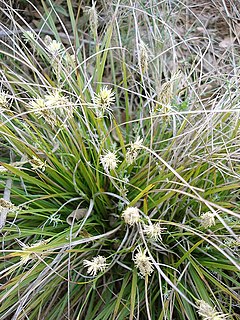
Carex is a vast genus of more than 2,000 species of grass-like plants in the family Cyperaceae, commonly known as sedges. Other members of the family Cyperaceae are also called sedges, however those of genus Carex may be called true sedges, and it is the most species-rich genus in the family. The study of Carex is known as caricology.

Carex bromoides, known as brome-like sedge, brome-sedge, and dropseed of the woods, is a species of sedge in the genus Carex. It is native to North America.
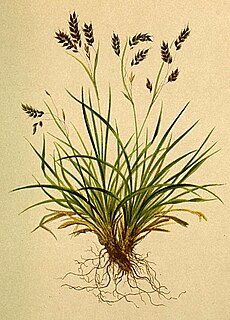
Carex capillaris, the hair-like sedge, is a species of sedge found in North America and northern Eurasia.

Carex viridula, known as little green sedge, green sedge, or greenish sedge, is a small flowering plant native to North America, Europe, Asia, and Morocco.
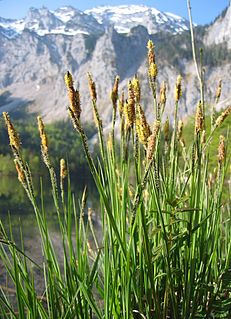
Carex elata, tufted sedge, is a species in the genus Carex, native to all of Europe, the Atlas Mountains of Africa, Turkey, Iran and Central Asia. It prefers to grow with its roots in water. Its cultivar 'Aurea' has gained the Royal Horticultural Society's Award of Garden Merit.

Carex oshimensis, Japanese sedge, is a species in the genus Carex, native to Japan. With its striped foliage, it is widely used as a non‑spreading ground cover. Its cultivar 'Evergold' has gained the Royal Horticultural Society's Award of Garden Merit.

Carex flava, called hedgehog grass, is a widespread species of sedge, native to the northern United States, Canada, Iceland, Europe, the Atlas Mountains in Africa, the Transcaucasus area, and parts of Siberia. It is the namesake of the Carex flava species complex.
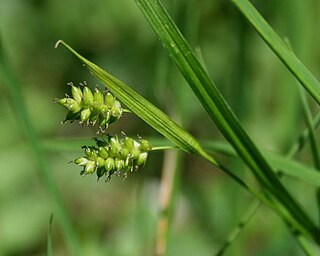
Carex pallescens, called pale sedge, is a widespread species of flowering plant in the genus Carex, native to the northeastern United States, eastern Canada, Iceland, Europe, Tunisia, and western Asia. It has unstable chromosome numbers.
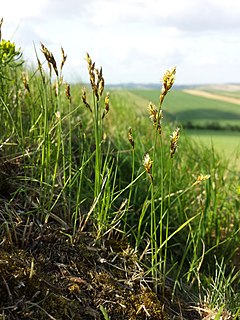
Carex praecox, the spring sedge, is a species of flowering plant in the genus Carex, native to Europe, western Asia, and Mongolia. Its chromosome number is 2n=58, with some uncertainty.

Carex curvula, the Alpine sedge, is a species of flowering plant in the genus Carex, native to the Pyrenees, the Alps, the Carpathians, and the mountains of the Balkans. It has gone extinct in Germany. It propagates almost exclusively clonally, with some of its clonal colonies estimated to be 2,000 years old.
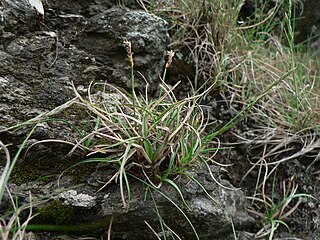
Carex rupestris, called the curly sedge and rock sedge, is a species of flowering plant in the genus Carex, native to temperate and subarctic North America, Greenland, Iceland, Europe, and Asia. It prefers to grow on rocky ledges.

Carex stipata, variously called the prickly sedge, awl-fruited sedge, awlfruit sedge, owlfruit sedge, swamp sedge, sawbeak sedge, stalk-grain sedge and common fox sedge, is a species of flowering plant in the genus Carex, native to Canada, the United States, China, Korea, Japan, and Far Eastern Russia. It is a wetland obligate.

Carex atrata, called black alpine sedge, is a widespread species of flowering plant in the genus Carex, native to Greenland, Iceland, and most of Europe, plus scattered locations across temperate Asia, including Anatolia, Siberia and the Himalaya, as far as Taiwan and Japan. Its chromosome number is 2n=52, with some variants reported.
Carex microglochin, called the fewseeded bog sedge and bristle sedge, is a species of flowering plant in the genus Carex, native to temperate and subarctic North America, South America, Europe and Asia. It is uncertain which hemisphere it originated on before dispersing to the other.
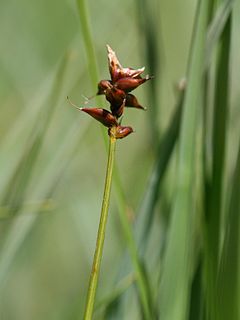
Carex dioica, the dioecious sedge, is a species of flowering plant in the genus Carex, native to Iceland, the Faroes, Svalbard, nearly all of Europe, western Siberia, and the Altai. It prefers to live in calcareous fens.

Carex divulsa, the grey sedge, is a species of flowering plant in the genus Carex, native to Macaronesia, Europe, northwest Africa, the Caucasus region, and the Middle East as far east as Turkmenistan. It has been introduced to northeast Argentina, the District of Columbia and Pennsylvania in the United States, Ontario in Canada, the North Island of New Zealand, and Tasmania and Victoria in Australia. It is the namesake of the Carex divulsa aggregate.

Carex hostiana, the tawny sedge, is a species of flowering plant in the genus Carex, native to Europe and northeast Canada, and extinct in Massachusetts. It is a member of the Carex flava species complex.

Carex demissa is a species of sedge, native to Iceland, Macaronesia, all of Europe, and western Asia to the Himalayas. It has been introduced to eastern Canada, New Jersey, and Tasmania. It is a member of the Carex flava species complex.




















